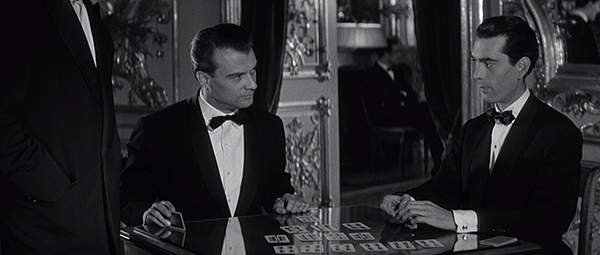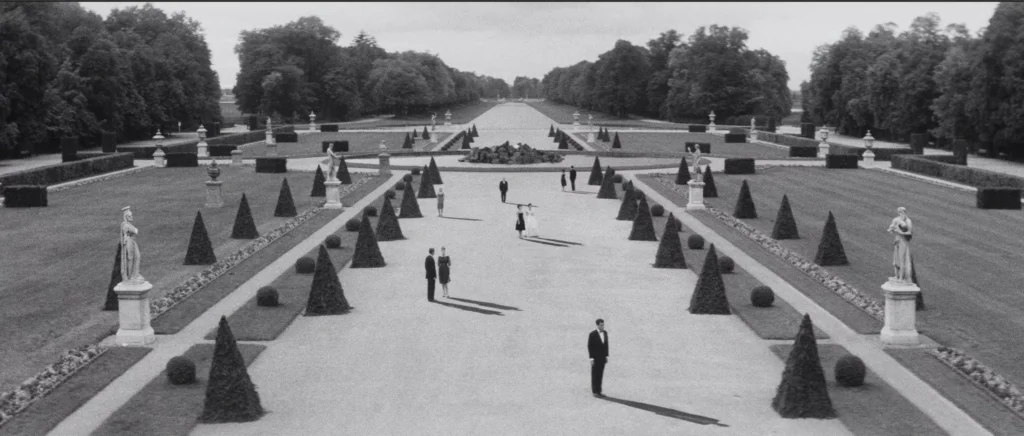Classic Film: Last Year at Marienbad
Written by Ian Thomas Malone, Posted in Blog, Movie Reviews, Pop Culture
Time waits for no one. People, on the other hand, wait around for plenty. People put off their dreams, sometimes for legitimate reasons, often simply because the timing isn’t quite right, whatever that means. Miserable relationships endure, not because anyone thinks the situation might improve, but because change is scary, and the cold dark unknown feels more intimidating than the familiar devil.
The 1961 film Last Year at Marienbad (Original French title: L’Année dernière à Marienbad) structures its entire narrative around the psychology of lust, tossing out all conventional notions of narrative and structure. A man (Giorgio Albertazzi), staying at a grand palace that had been converted into a hotel, sees a woman (Delphine Seyrig) he claims to have met the previous year. The woman, who came to the hotel with a second man (Sacha Pitoëff), possibly her husband, denies knowing him, particularly his claims that she asked him to wait a year before they could run away together.
Director Alain Resnais uses the beautiful baroque architecture of the hotel as a backdrop for Albertazzi’s seductive narration, creating luscious, dreamy visuals of a passionate vacation fling that constantly overwhelms the senses, even before you consider the additional psychological layer of whether the man is telling the truth. Screenwriter Alain Robbe-Grillet frequently uses repetition in the constant voice-overs, further muddying the waters between reality and the dream. Skepticism toward the man’s claims eventually gives way to the undeniable charm to be found in the labyrinth that is Albertazzi’s storytelling capabilities.
The mathematical strategy game NIM plays a large role in the narrative. The second man frequently exerts his dominance over the rest of the hotel guests with his commanding performances in the game. The surface-level simplicity of Nim is a point of frustration for many, the game itself boiling down to a matter of mathematics, with no one able to develop a strategy to end the second man’s streak. Life itself can often appear simple on paper, until we have to step outside our heads and go about the messy labor of achieving our dreams in a world that has its own ideas.

Despite the film’s ample avant-garde trappings, a nonlinear narrative where no one has a name, Resnais’s work is eminently accessible. The taut 94-minute runtime gives the film plenty of space to forge its unique identity without exhausting the audience. The dreamy cinematography functions as an extension of the screenplay, keeping everyone engaged even as the narrative wades into obtuse territory.
Resnais constantly plays with the framing of the camera, creating the illusion of a dreamlike state. There is often some distance between the narration and the events unfolding on screen. The other guests at the hotel often feel like mannequins, heightening the sense of a cat and mouse game between the man and the woman, on top of the power dynamic already at play with the second man’s dominance at NIM over everyone else.
The whole film plays out like the visual manifestation of the illicit fever dream being described by the narration. Affairs are often described as intoxicating. People don’t have affairs out of logic or sensibility. They do it for the thrill. Resnais eloquently captures that sensation, bringing his audience along for the ride.
The difference between love and lust often boils down to the hunt. Anyone can have a fantasy. The barriers to acting on such carnal desires are not particularly rigid, especially in a hotel the size of a palace. Unhappiness, on the other hand, can be a rather imposing panopticon. The mind can concoct all sorts of reasons to stay miserable, some more logical than others.
Does truth matter in the realm of passion? Resnais has a beautiful way of deconstructing reality, challenging the way we think about the world through the romance of desire. As uncomfortable as it is to say, facts don’t really have much business in the realm of love. Romance is inherently a buy-in. It seems ridiculous to say that it doesn’t really matter if someone was telling the truth about having met you a year before, but people don’t fall in love based on logic. How we feel is what really matters.
All of that might sound ridiculous, but the great triumph of Last Year at Marienbad is the way that Resnais makes the absurd seem palatable when contrasted with the alternative that is reality for the woman. None of us would be comfortable admitting that we’d fall for a man who told us things we knew to be untrue. Plenty of us would also feel uneasy admitting that we’re staying in loveless relationships because we’re too afraid of the alternative, yet we all know someone currently mired in that reality. For a film that offers nothing in the way of answers, there is so much clarity to be found in Resnais’ work.











